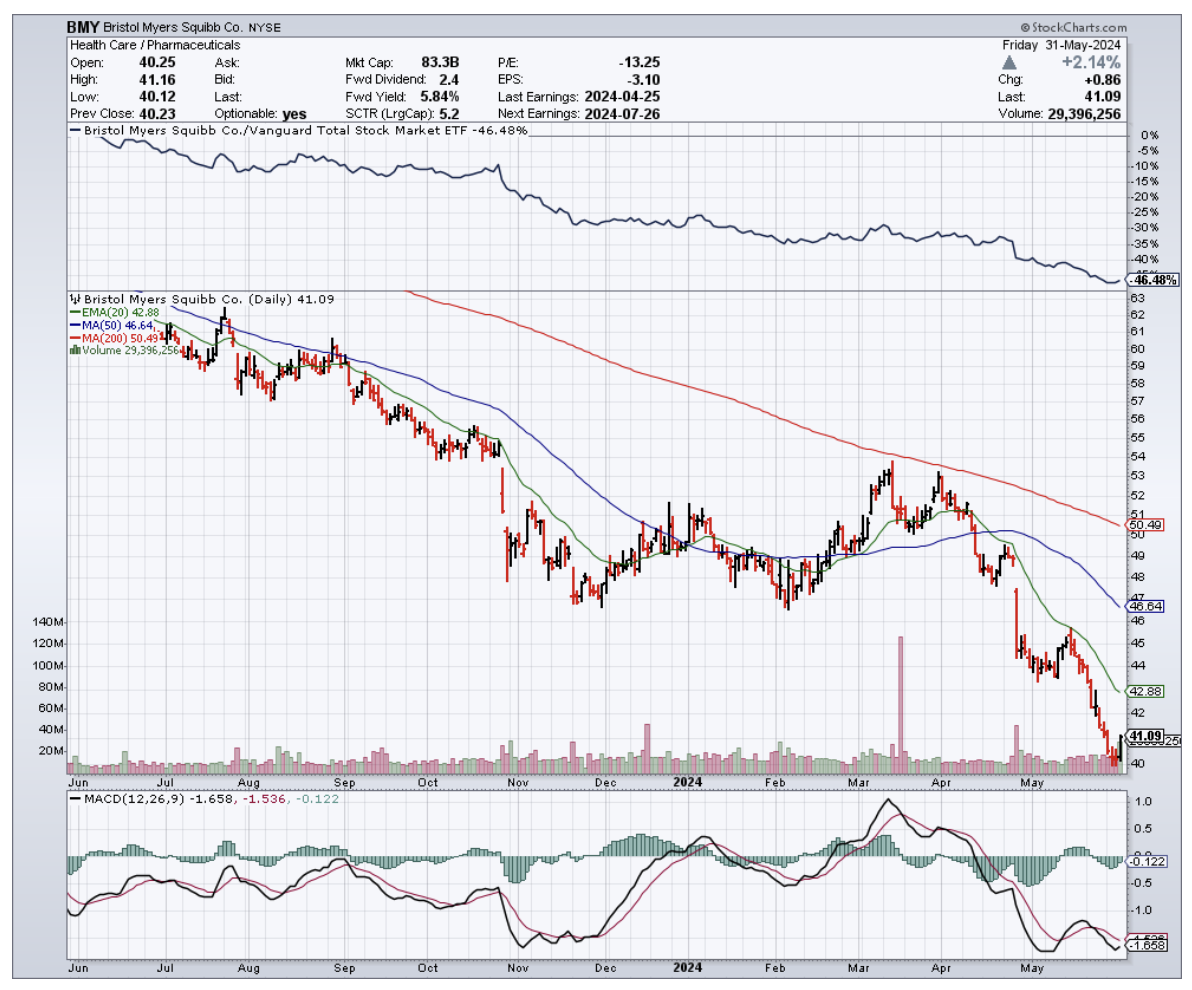Is This The Comeback Trail After A Cliffhanger?
I once scaled a mountain everyone swore was cursed after a landslide. They missed out on stunning vistas and the thrill of conquering a challenge. Turns out, the best views often come after a little rock bottoming.
That brings to mind Bristol-Myers Squibb (BMY), the pharma giant fresh off a stock price landslide of its own.
Bristol-Myers Squibb shares have been in a freefall lately, plunging to nearly half their 2022 peak of $80. The culprit? You guessed it: those dreaded patent expirations and a whole lot of hand-wringing about future growth.
However, as a contrarian investor, I see this doom-and-gloom scenario as an opportunity rather than a setback.
Remember those times when the market turned its back on the likes of Meta Platforms (META) and NVIDIA (NVDA)? They were trading for peanuts not so long ago and look at them now.
Now, you might be thinking, "So, BMY's taken a hit. Is it really that undervalued?"
Well, I've been digging through the stock's history, all the way back to 2012, and something interesting popped up: since 2013, BMY has rarely dipped below its 200-week simple moving average (that fancy brown line on your charts). It just recently broke through that floor, which could mean we're looking at a once-in-a-decade buying opportunity.
Every time this stock has even gotten close to that 200-week line, it's been a signal to buy, and the stock has always bounced back.
Let's not forget that just a couple of years ago, this stock was cruising at over $80 a share. Now it's practically a penny stock compared to that. Has the company really lost half its value?
Bristol-Myers Squibb's been facing some headwinds, no doubt about it. Revlimid, their blockbuster cancer treatment, lost patent protection in 2022, and Eliquis, their anti-stroke champ, is set to follow suit in 2026.
But don't count them out just yet. The company still has plenty of promising drugs in its arsenal that aren't facing patent cliffs anytime soon.
Plus, they've been on a shopping spree, snatching up high-potential companies like Karuna, RayzeBio, and Mirati in 2023. These acquisitions could be just the ticket to reignite growth and fill the void left by those expiring patents.
In a strategic move to streamline operations and boost future earnings, Bristol-Myers Squibb also announced a $1.5 billion plan to cut expenses, including eliminating around 2,200 jobs.
Sure, 2024 might be a bit of a transition year with some one-time charges, but this bold move could pave the way for a leaner, meaner, and ultimately more profitable company in the years to come.
Turning to the financials, analysts are forecasting a bit of a slow year for Bristol-Myers Squibb in 2024, with earnings per share of $0.56 on about $46 billion in revenue.
But they're expecting a major rebound in 2025, with earnings soaring to $6.94 per share on similar revenue.
And even though 2026 projections show a slight dip to $6.30 EPS on $43.85 billion revenue, this isn't a company you're buying for explosive growth.
The current stock price is roughly seven times the 2025 earnings estimate. That's a steal, my friends. Sure, they've got a bit of debt on the books – $57.46 billion to be exact, with $9.67 billion in cash. But hey, they still earned a respectable "A2" credit rating, so they're not exactly teetering on the brink.
Now, let's talk about another star of BMY’s show: that sweet, sweet dividend.
Bristol-Myers Squibb is dishing out $0.60 per share each quarter, which adds up to a juicy 5.5% yield. Think about that for a second.
That's more than most money market funds are offering right now, and with the Fed likely to slash interest rates in the near future, those yields are only going to shrink.
Remember that "Fed dot plot" they released earlier this year? It's hinting at a 2.25-point drop in the Fed Funds rate by the end of 2026. That could take us from the current 5.25% to 5.5% range all the way down to 3% to 3.25%.
Imagine how much more tempting that 5.5% dividend yield from Bristol-Myers Squibb will look when money market rates are potentially 40% lower.
That makes Bristol-Myers Squibb's current situation practically irresistible to a contrarian investor like me. We're talking about a stock trading at a price we haven't seen in over a decade, relative to the 200-week simple moving average. That's the kind of bargain that makes my palms sweat.
And that's not all. With a valuation hovering around seven times the 2025 earnings estimate and a dividend yield that makes money market funds look like pocket change, this could be a recipe for serious upside.
Sure, patent expirations are a pain in the you-know-what for every pharma company. But let's not forget those initial years of patent protection are like a golden ticket. Plus, Bristol-Myers Squibb has a proven track record of developing and acquiring blockbuster drugs.
Of course, there's no sugarcoating the challenges and risks, but when a stock's 5.5% yield and a rock-bottom P/E ratio are staring you in the face, it's hard to ignore the potential upside. That's why I'm dipping my toes in with a small initial position, gradually building it up over time.
I'm playing the long game here, folks. I believe that eventually, just like with other beaten-down stocks, investors will wake up and realize the incredible value this historically successful company offers.
In the meantime, that generous dividend will keep those money market-like payouts rolling in while we wait for the share price to rebound.


